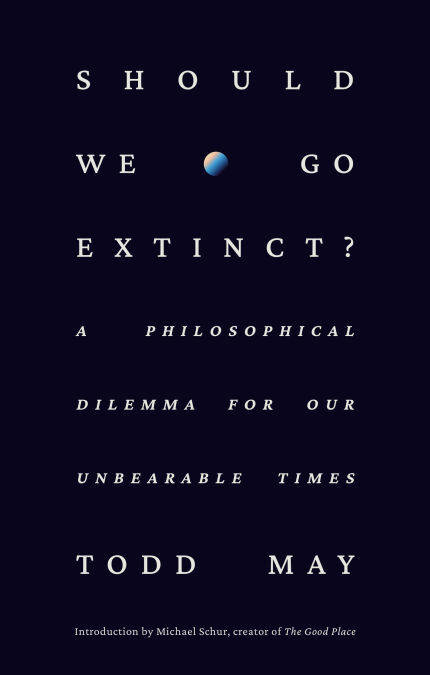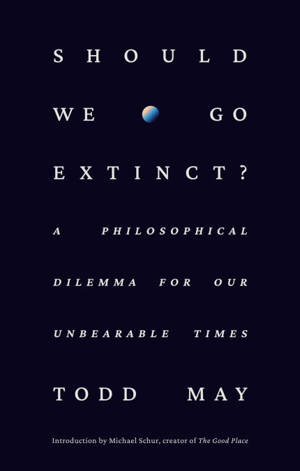
- Retrait gratuit dans votre magasin Club
- 7.000.000 titres dans notre catalogue
- Payer en toute sécurité
- Toujours un magasin près de chez vous
- Retrait gratuit dans votre magasin Club
- 7.000.0000 titres dans notre catalogue
- Payer en toute sécurité
- Toujours un magasin près de chez vous
Should We Go Extinct? EBOOK
A Philosophical Dilemma for Our Unbearable Times
Todd May
Ebook | Anglais
7,18 €
+ 7 points
Format
Description
Should we bring new humans into the world? Or would it be better off without us? A renowned philosopher and advisor to NBC’s The Good Place offers a thoughtful exploration of humanity’s future—or lack thereof.
“For more than five years, Todd May was my philosophical advisor. I heartily recommend that he be yours as well. (It helps that he’s quite funny.)”—Michael Schur, from the Introduction
These days it’s harder than ever to watch TV, scroll social media, or even just sit at home looking out of the window without contemplating the question at the heart of philosopher Todd May’s Should We Go Extinct? Facing climate destruction and the revived specter of nuclear annihilation even as humans continue to cause untold suffering to our fellow creatures on planet Earth, we are forced each day to contemplate whether the world would be better off in our absence.
In this timely, fascinating examination, May, a renowned philosopher and advisor to the acclaimed TV show The Good Place, reasons both for and against the continuation of our species, trying to help us understand how and whether, the positive and negative tallies of the human ledger are comparable, and what conclusions we might draw about ourselves and our future from doing so. He discusses the value that only humans can bring to the world and to one another as well as the goods, like art and music, that would be lost were we no longer here. On the other side of the ledger, he walks us through the suffering we cause to nature and the non-human world, seeking to understand whether it’s possible to justify such suffering against our merits and if not, what changes we could make to reduce the harm we cause.
In this moment of rising pessimism about the future, and as many people wonder whether they should bring children into such a dark and difficult world, the questions May tackles in Should We Go Extinct? are hardly theoretical. As he explores the complexities involved with changes such as an end to factory farming, curbing scientific testing of animals, reducing the human population, and seeking to develop empathy with our fellow creatures, May sketches a powerful framework for establishing our responsibilities as a species and gives hope that we might one day find universal agreement that the answer to his title question should be No.
“For more than five years, Todd May was my philosophical advisor. I heartily recommend that he be yours as well. (It helps that he’s quite funny.)”—Michael Schur, from the Introduction
These days it’s harder than ever to watch TV, scroll social media, or even just sit at home looking out of the window without contemplating the question at the heart of philosopher Todd May’s Should We Go Extinct? Facing climate destruction and the revived specter of nuclear annihilation even as humans continue to cause untold suffering to our fellow creatures on planet Earth, we are forced each day to contemplate whether the world would be better off in our absence.
In this timely, fascinating examination, May, a renowned philosopher and advisor to the acclaimed TV show The Good Place, reasons both for and against the continuation of our species, trying to help us understand how and whether, the positive and negative tallies of the human ledger are comparable, and what conclusions we might draw about ourselves and our future from doing so. He discusses the value that only humans can bring to the world and to one another as well as the goods, like art and music, that would be lost were we no longer here. On the other side of the ledger, he walks us through the suffering we cause to nature and the non-human world, seeking to understand whether it’s possible to justify such suffering against our merits and if not, what changes we could make to reduce the harm we cause.
In this moment of rising pessimism about the future, and as many people wonder whether they should bring children into such a dark and difficult world, the questions May tackles in Should We Go Extinct? are hardly theoretical. As he explores the complexities involved with changes such as an end to factory farming, curbing scientific testing of animals, reducing the human population, and seeking to develop empathy with our fellow creatures, May sketches a powerful framework for establishing our responsibilities as a species and gives hope that we might one day find universal agreement that the answer to his title question should be No.
Les avis
Nous publions uniquement les avis qui respectent les conditions requises. Consultez nos conditions pour les avis.







